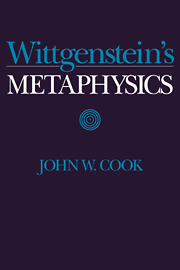Book contents
- Frontmatter
- Contents
- Preface
- List of Abbreviations
- Introduction
- Part I From Idealism to Pure Realism
- Part II The Metaphysics of Wittgenstein's Later Philosophy
- Part III Causation and Science in a Phenomenal World
- Part IV Logical Possibilities and the Possibility of Knowledge
- 14 Logical Possibilities and Philosophical Method
- 15 The Search for a Phenomenalist's Theory of Knowledge
- Part V The Past, Memory, and The Private Language Argument
- Name Index
- Subject Index
15 - The Search for a Phenomenalist's Theory of Knowledge
Published online by Cambridge University Press: 05 November 2011
- Frontmatter
- Contents
- Preface
- List of Abbreviations
- Introduction
- Part I From Idealism to Pure Realism
- Part II The Metaphysics of Wittgenstein's Later Philosophy
- Part III Causation and Science in a Phenomenal World
- Part IV Logical Possibilities and the Possibility of Knowledge
- 14 Logical Possibilities and Philosophical Method
- 15 The Search for a Phenomenalist's Theory of Knowledge
- Part V The Past, Memory, and The Private Language Argument
- Name Index
- Subject Index
Summary
In On Certainty Wittgenstein was concerned, as he said, with how to show that “we know truths, not only about sense-data, but also about things” (OC, §426). Why did he think there was a difficulty about this? Since he was not a dualist, he was not faced with Moore's problem about how one could know what there is beyond one's sense-data. In Chapter 7, where I traced the history of Wittgenstein's epistemological concerns, we saw that his problem was one that is peculiar to phenomenalists.
Generating Wittgenstein's Problem
I will identify his problem by describing an example in which the verb “to know” plays a role and by then introducing, in several stages, considerations of the sort that generate Wittgenstein's problem. The example is as follows. One foggy morning a friend and I are strolling along a country road. A dark shape looms in the fog ahead, and my companion says, “It must be a large tree.” I say, “No, it's a house. Don't you see the lines of the roof?” He demurs, and I say to him, “I know that's a house; I've walked along this road before.” When we draw closer, I retract this, saying, “You were right; it is a tree. It certainly looked like a house. I guess we're not where I thought we were.” Here is a case in which a knowledge claim gets retracted because of what is found on closer inspection.
- Type
- Chapter
- Information
- Wittgenstein's Metaphysics , pp. 221 - 236Publisher: Cambridge University PressPrint publication year: 1994



